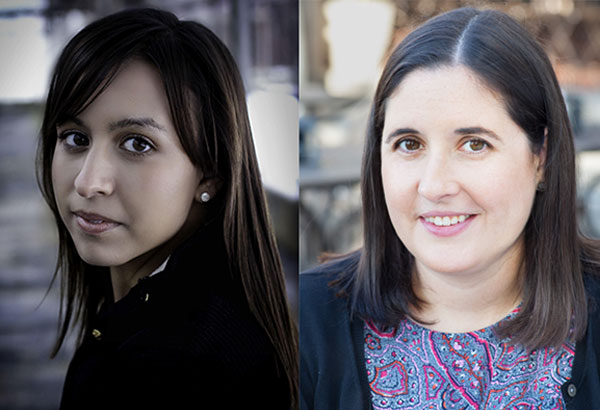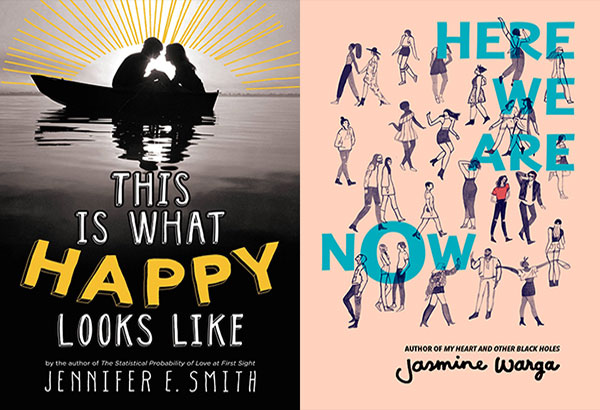Stepping stones

All grown up: YA authors Jasmine Warga and Jennifer E. Smith know a thing or two about how to keep it true when it comes to sensitive topics, and the importance of the love story.
MANILA, Philippines — As an occasional — previously avid — YA reader, it always floors me how certain novels can bring you back to a certain point in your life when you were more confused than your current self, but were nonetheless treated to blissful bouts of adolescent euphoria. For some of us, YA might even have been a gateway to our more adult reading tastes, like Harry Potter and Greek mythology or — no judgment — Twilight and Anne Rice. But regardless of what you read back then, YA nonetheless has that capacity to remind you how it was to be younger than you are now, as well as the experiences you’ve undergone to navigate the perils of teenage life.
That said, it’s a thrill to meet two authors who’ve made their own contributions to this ever-expanding genre. National Book Store has partnered Jasmine Warga of My Heart and Other Black Holes fame, along with Jennifer E. Smith of Windfall, This is What Happy Looks Like, and The Statistical Probability of Falling in Love. Each with their own unique voice and range of experience, we got to sit down with them and talk further about their own industry experiences, how to keep true when it comes to sensitive topics, and the importance of the love story.
YOUNG STAR: As a relative newcomer to the publishing industry, what are your most memorable experiences as an author?
JASMINE WARGA: Well, I think the first day my book came out will always be really memorable to me in that I’ll always remember that launch party. Because I went to the bookstore where, in high school, I’d always cruise the bookshelves and sort of daydream of someday seeing my own book. And I was there to celebrate with friends and family. Also, I think when My Heart and Other Black Holes was sold to become a movie, it was a very memorable day and experience for me. I remember when we first heard we had movie interest, I’d been going to book festivals, and it’d been really snowy so it took me forever to get there. So when they told me there’d be a movie, I remember thinking I was hallucinating. So that was very exciting. And just all the letters and messages I’ve gotten from readers, from across the globe. That’s the most surprising thing to me — how international the book was made, it was just really a gift. And getting to meet other writers, whose work you’ve admired for years.
Your first book, My Heart and Other Black Holes, deals with a lot of touchy topics, like depression, suicide, or having a parent in jail. For Here We Are Now, could we expect to have similar themes?
I think Here We Are Now, on the surface, is a lighter book in a way, but it’s still dealing with a lot of the same questions that My Heart and Other Black Holes dealt with, like what does your family past mean for your future, how is it possible to love a family member while simultaneously being disappointed in them, and how to hold space for those two things. I think a big part of coming of age is learning to accept that your parents, when you were little, were your superheroes… I’m the parent of two little girls, and my toddler thinks I’m the coolest, best person ever. But there’s going to be a moment not too long from now when she’s going to discover that I’m a human who makes mistakes and has flaws just like everyone else. So I think a big coming-of-age moment is realizing that about your parents, but learning how to hold your disappointment in one hand, and your love for them in another, and reconciling those two things.
Nowadays, there’s a lot of clamor for accurate or fair representation, especially when it comes to issues of race, or mental health, or gender identity, among others. Since your books also touch on these topics, how do you satisfy that need?

Jasmine Warga's and Jennifer E. Smith's books are available in National Book Store branches nationwide.
I mean, I hope that I did! The thing is, I think it’s a difficult thing to define — so for me, I might find My Heart and Other Black Holes to be an accurate representation of mental illness, then someone else who also (has gone through) mental illness may not, in their opinion, think it’s as valid as my opinion. But for me, I just try to write the most honest book that I can, and it’s not meant to be a comprehensive textbook about depression, except for one particular person (Aysel) — and there’s also Roman’s perspective, so two particular teens’ experience.
* * *
Jennifer, you’ve been publishing since 2008. That said, what lessons have you learned over close to a decade?
JENNIFER E. SMITH: Ten years makes me feel like I’ve been around for a hundred years! ‘Cause it’s changed so much, you know, from the time I’ve been there. I think the biggest lesson I’ve taken personally from my career is that, often from the outside, I think careers can look like a really straight shot. But actually, that’s not been the case — it’s full of ups and downs, it’s full of triumphs and milestones and setbacks. And when I look at the beginning, I wrote two books that didn’t get published before my first one did. And then my first two books that got published, they didn’t sell very much. It wasn’t until my third book — The Statistical Probability of Love at First Sight — that it sort of broke out, but I wouldn’t have written Statistical Probability without the first two that were published and didn’t sell any copies. And I wouldn’t have written the two that didn’t sell if I didn’t write the two that weren’t published at all.
So it’s a business of stepping stones, in that you learn from each thing and carry it with you. And sometimes what would look like a failure is actually just a (blessing in disguise).
Your books have a certain quality to them, in a sense that they are able to capture the feelings of adolescent love, that sort of softness. When you craft these stories, do you think about that consciously, like “I want my story to sound like this, I want to write that sentence”?
I think at this point my voice is sort of my voice, and when you’ve written for a long time your style becomes a bit set. But I am very obsessed with how a sentence sounds. (laughs) I once told my agent, who yelled at me, that I’d prefer to write a beautiful sentence than an interesting novel. And she was like, “Do both!” (laughs)
But I really like the musicality of sentences and the words, I often read my drafts out loud to make sure that they sound a certain way, and I do craft them pretty carefully. I am really overly preoccupied perhaps with the way sentences are made. Because for me, that’s the fun part, that’s the craft of it.
I’ve seen some YA novels that tackle a certain genres — like fantasy, or adventure — and tack on romance as a side piece. But when you write your stories, you put romance as the overarching story.
Windfall’s a bit different that way, (romance) is a bit more secondary, which is different from my books. But I always try to strike a balance between full love stories and kind of family stories, ‘cause I don’t want them just to be romances, because there’s so much happening in a person’s life at any given moment, and I’m always a little bit careful about that. But yeah, I’m also a romantic, and an optimist at heart, so I love writing those whole stories that are bittersweet.















